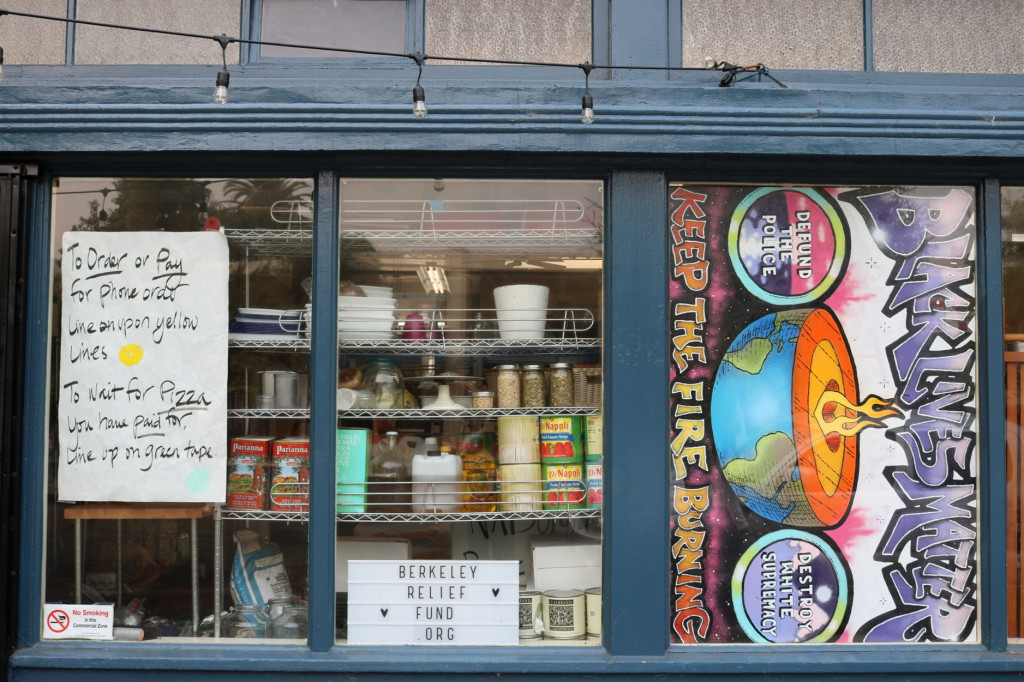On the corner of College Avenue and Russell Street lies a hidden gem of a business: Nabolom Bakery and Pizzeria. This cozy haven, which isolates itself from the typical chaos of Elmwood, is a neighborhood favorite, and for good reason. Not only has Nabolom remained a place people love for its great pizza, it also serves as a gathering spot that brings together diverse crowds.
As a small, Black-owned business that has been central to Berkeley’s community for years, Nabolom thrives from neighborhood support. With pressure on small businesses from both gentrification and the COVID-19 pandemic, it is now more important than ever to preserve places like Nabolom that define the unique character of Berkeley neighborhoods.
Along with baked goods and drinks, the bakery offers a different pizza everyday, all made with a classic Bay Area sourdough crust. However, one of the reasons Nabolom has remained such a consistent favorite is its environment and community. Walking in, the amiable energy can be felt immediately: the room is filled with families eating together and teenagers hanging out. A Nabolom experience is not complete without a friendly greeting from Julia Elliot, the co-owner who impressively never forgets a face.
Along with the other owner, Sabra Stepak, Elliot has worked hard to foster this welcoming environment at Nabolom, which they feel is fading in Berkeley nowadays. “We grew up here, and we remember that there used to be a very strong Berkeley community. For us, it’s not really there anymore. There’s a lot more separation between social classes now. So when we came [to Nabolom], we wanted to try to bring things back to something more human, like the way we remember it,” said Elliot. This spirit is particularly present among their employees, some of whom Elliot mentors herself.

Diego Walker, a Berkeley High School (BHS) senior in Communication Arts and Sciences (CAS), has worked at Nabolom for a little less than a year. He reflected: “We’re kind of like a family. My boss employs and mentors all of us, and they try to help us become better people and serve the community beyond just food.”
This year, the COVID-19 pandemic shut down many businesses and left neighborhood favorites at risk. As a result, Nabolom has been forced to sell pizzas and baked goods under unique circumstances. The bakery stopped allowing people to sit down or use the bathroom on March 14, two days before California’s shelter-in-place order. Nabolom also moved its entire counter setup to the very front of the store to minimize physical interactions. This quick response made a huge difference, Stepak said: “We were able to pivot very quickly. Whatever we were doing wasn’t working as well before [the pandemic]. It was just very slow. But the shelter-in-place created a lot of trust with our loyal customers, and our business actually went up.”
Even so, the policing and responsibility put on small businesses has only grown during the pandemic. “Restaurants are already held to a higher standard. During COVID-19, there's even more policing, and people don’t want to take responsibility, so they dump it all on us. In the end, there is an expectation that the business owner is always responsible,” said Stepak.
Nevertheless, many customers remain loyal. Kate Bartholemew, an Elmwood local, said, “We love Nabolom! We live really close by and the pizza is great, especially when it’s a Friday night and no one wants to cook supper. The chocolate cookies are unbeatable, and people are always so friendly.”
Nabolom is both a small and Black-owned business, which places it in a potentially precarious position. Gentrification in the East Bay has pushed out Black-owned businesses, making it increasingly difficult to succeed as a mom-and-pop shop. “There’s a mythology surrounding being a small business owner, like it's the American dream. But that’s all complete bullsh*t. I honestly don’t even know how we made it,” said Stepak. However, she expressed her gratitude towards Berkeley: “The community has been really supportive. Berkeley wants this fantasy small business dream to thrive.”
Despite this constant struggle, the pandemic brought surprising benefits to the bakery. Stepak remarked: “The blessing was that it gave us a big break from being tied to the place people remembered before we bought it. This pandemic, which is bigger than us, has made the bakery ours. We can do it how we want. We aren’t beholden to the past.”





